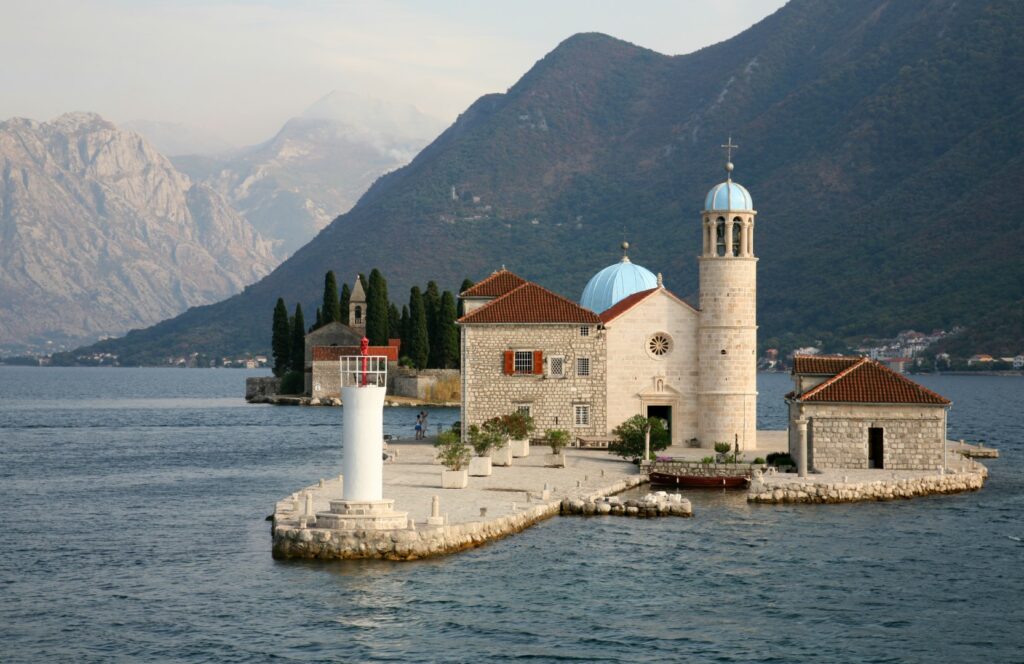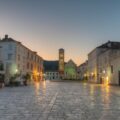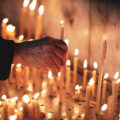Who do Montenegro’s churches belong to?
Who do Montenegro’s churches belong to?
Are medieval churches the cultural heritage of the state, and property of Montenegro, or are they the private property of the Orthodox Church?
Church or State? The battle for control of Montenegro’s future
Montenegro is a small Balkan country on the Adriatic coast where 72% of the population declare themselves as Orthodox.[1] Therefore, the largest religious community in Montenegro is the Serbian Orthodox Church (SOC). Whilst the vast majority of Montenegrin are Orthodox, there are also 16% who are Muslims, and 3.4% who are Catholics.[2] According to the constitution, Montenegro is a secular state in which religious activities are not allowed in primary and secondary schools, apart from schooling and training for priests.[3]
Despite the constitutional principles, a major problem in relations between the SOC and the state arose when the Parliament adopted the so-called Law on Freedom of Religion in December 2019.[4] A special issue of the law is that it prescribes that all religious buildings, as well as religious property, existing in Montenegro before December 1918, must become the property of the state if the religious community is unable to provide sufficient evidence that it is their property.[5]
The promotion of this legislative change has led to varied reactions among religious groups. Whilst the Islamic community states the law is necessary, they suggested a number of changes to the government’s plans. However, the SOC has expressed their outright opposition to the adoption of this law.[6] In their view, the law is unacceptable and discriminatory.[7]
An electoral win for the supporters of the SOC
The adoption of this law has led to controversy within the Montenegrin parliament.[8] Opposition MPs, who support the SOC’s position, have forcefully opposed its passage. In December 2019, debates regarding this legislative change led to dramatic scenes. Opponents of the change resorted to disorder, damaging microphones and pouring water on the ruling party’s MPs as a means of showing their opposition.[9]
This vote on the Law on Freedom of Religion also led to the danger of civil unrest. While the law was being voted on in the parliament, the police blocked certain places in the capital, due to possible protests.[10] Parliamentary approval of the law provoked significant numbers of Montenegrins to take to the streets.[11]
With the support of his section of civil society, the Metropolitan (the leading member of the SOC clergy), claimed the law was against the Orthodox Church. Even after the law had been passed by the Parliament, protests led by the SOC clergy and its followers continued. Every evening, after the worship services, believers would gather in prayer processions and walk the streets of the cities in Montenegro.[12]
In Serbia as well as in Bosnia and Herzegovina, supporters of the SOC have held religious protests to express their anger.[13] The then Patriarch of the SOC, Irinej Gavrilović, stated that he was saddened by the fact that the legislation had been passed.[14] Milo Đukanović, who was President of Montenegro at the time, argued that the new legislation was in line with international conventions such as the provisions of the UN and the European Convention on Human Rights.[15]
The prayer processions continued to take place until March 2020, when the spread of the coronavirus pandemic caused a temporary stop. Yet by April 2020, the prayer processions had resumed and continued to be a feature of Montenegrin civil society until August, when parliamentary elections were held.[16] In a decisive turn for the future of the legislation, the election was won by a political coalition that openly supported the SOC in the debate on the disputed law.[17]
Amendments and tensions
As a result of these elections, Zdravko Krivokapić became the new Prime Minister of Montenegro. Krivokapić has been supported by the SOC.[18] Therefore, Krivokapić’s government has introduced amendments to the law to remove the articles which had caused protests by the SOC and its supporters.[19] [20] [21]
However, this change led to a counterreaction. The fact that the provisions of the law with regards to religious properties had been removed led to protests by those who had supported the initial changes in the streets of Podgorica.[22] These protesters expressed their fear that churches and monasteries, which in their view are part of Montenegro’s cultural heritage, would instead pass into the hands of the SOC.[23] After accepting the amendments, Prime Minister Krivokapić argued that the changes to the law had rectified the wrongdoing that the SOC had been subjected to by the previous government.[24]
Ownership of the faith
Whilst the threat to the SOC of the initial legislation regarding properties seems to have passed, the issue is not yet resolved. The next stage of relations between the SOC and the Montenegrin government relates to the signing of another important document called the Basic Agreement. This document represents an agreement of mutual respect and competencies between the SOC and the state.[25] However, there have been criticisms that the draft of the Agreement is not as comprehensive as that of the one signed with the Catholic Church.[26]
The inability to confirm an Agreement between the state and the SOC has meant the legal status of the Orthodox Church remains unresolved. The amended religious law, which will allow the SOC to take ownership of its churches, has still not been put into place. This is because this law cannot be completed until the Agreement is signed.
In addition, the constant political conflict between the prime minister and the president on the issue continues to create controversy for the SOC, in particular with regards to the allegation that Serbia is using the SOC to pursue its interests in Montenegro. As a result of this ongoing uncertainty, the future of Montenegro’s churches and monasteries is still unclear and it seems likely that it will continue to be an issue of great political importance in the months and maybe even years to come.
Want to learn more about similar topics? Go to the EARS Dashboard and receive weekly updates.
Sources
[1] Crna Gora: Demografska situacija, jezici i religije
[2] Crna Gora: Demografska situacija, jezici i religije
[3] Crna Gora: Demografska situacija, jezici i religije
[4] Crna Gora: Crkva i imovina
[5] Crna Gora: Crkva i imovina
[6] Zakon o slobodi veroispovesti u Crnoj Gori 2020.
[7] Ključni događaji u godinu dana Zakona o slobodi vjeroispovijesti u Crnoj Gori
[8] Усвојен закон о слободи вероисповести у Црној Гори
[9] Немири у Црној Гори: Усвојен закон о слободи вјероисповјести
[10] Немири у Црној Гори: Усвојен закон о слободи вјероисповијести
[11] Crna Gora, crkva i imovina: Đukanović potpisao zakon o slobodi veroispovesti
[12] Ključni događaji u godinu dana Zakona o slobodi vjeroispovijesti u Crnoj Gori
[13] Ključni događaji u godinu dana Zakona o slobodi vjeroispovijesti u Crnoj Gori
[14] Patrijarh Irinej: Duboko sam potresen dešavanjima u Crnoj Gori
[15] Usvojen Zakon o slobodi vjeroispovijesti
[16] Ključni događaji u godinu dana Zakona o slobodi vjeroispovijesti u Crnoj Gori
[17] Ključni događaji u godinu dana zakona o slobodi vjeroispovijesti u Crnoj Gori
[18] Ključni događaji u godinu dana Zakona o slobodi vjeroispovijesti u Crnoj Gori
[19] Влада Црне Горе усвојила измене Закона о слободи вјероисповијести
[20] Усвојене измијене Закона о слободи вјероисповијести
[21] Usvojene izmijene Zakona o slobodi vjeroispovijesti
[22] Crna Gora, crkva i imovina: Đukanović potpisao Zakon o slobodi veroispovesti
[23] CG: Protest građana zbog najavljenih izmena Zakona o slobodi veroispovesti
[24] Crna Gora, crkva i imovina: Đukanović potpisao Zakon o slobodi veroispovesti
[25] Митрополит Јоаникије: Не видим зашто до сада није потписан Темељни уговор
[26] Александар Ранковић: Уговор који нуде СПЦ другачији је од онога који је Црна Гора потписала са Ватиканом






